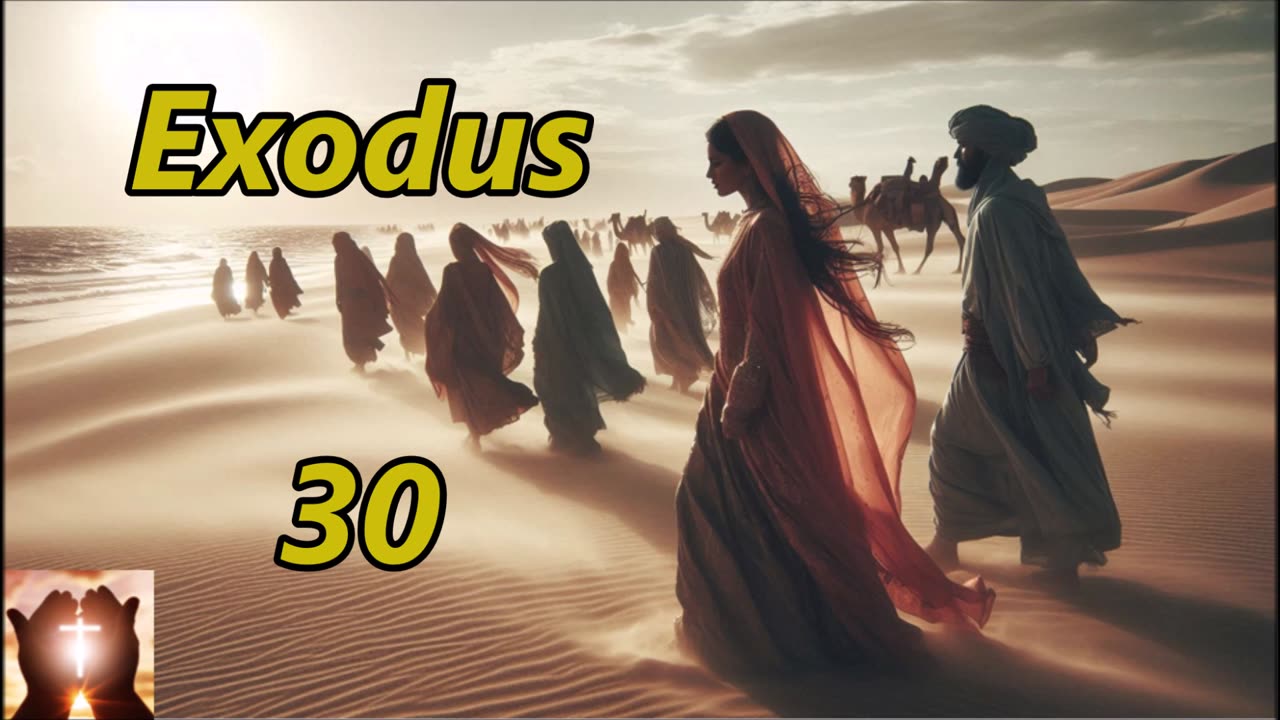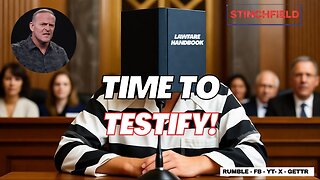Premium Only Content

Exodus 30
1. The Altar of Incense (Exodus 30:1–10)
Construction: Made of acacia wood, overlaid with gold, with horns on its corners.
Placement: Set in front of the veil before the Ark of the Covenant.
Purpose: To burn incense daily, symbolizing prayers rising to God (see Psalm 141:2).
Priestly Role: Aaron was to burn incense every morning and evening as part of daily worship.
Warning: No strange incense, burnt offerings, or grain offerings were to be offered on it—only sacred incense.
2. Atonement Money (Exodus 30:11–16)
Census Tax: Every Israelite man 20 years and older was to give half a shekel when counted.
Purpose: A ransom for their lives—reminding them that life belongs to God.
Equality: Rich and poor gave the same amount, showing that all are equal before God.
Use: The money supported the tabernacle, symbolizing shared responsibility in worship.
3. The Bronze Basin (Exodus 30:17–21)
Purpose: For the priests to wash hands and feet before entering the tabernacle or offering sacrifices.
Symbolism: Cleanliness represented spiritual purity—uncleanness meant death.
Lesson: Those who serve God must be pure in heart and action.
4. Anointing Oil (Exodus 30:22–33)
Ingredients: A specific blend of myrrh, cinnamon, calamus, cassia, and olive oil.
Use: To anoint the tabernacle, altar, furnishings, and priests—setting them apart as holy.
Prohibition: It was not to be used for common purposes or made for personal use.
5. Holy Incense (Exodus 30:34–38)
Ingredients: Stacte, onycha, galbanum, and pure frankincense.
Usage: Burned only in the sanctuary as an offering to God.
Warning: No imitation or personal use—it was holy to the Lord.
Key Takeaways:
Prayer is Central: The incense altar shows that prayer is a daily, sacred offering to God.
Holiness Is Not Optional: Everything associated with God’s presence had to be clean, holy, and consecrated.
Everyone Has a Role: The ransom offering taught that all are responsible for supporting and honoring God’s presence.
God Sets Boundaries: Sacred things are not for common use—God defines what is holy.
-
 LIVE
LIVE
Side Scrollers Podcast
3 hours agoEA BANNING “MAGA” Usernames? + Roblox CP Situation Gets WORSE+ CollarGate + More | Side Scrollers
1,217 watching -
 1:00:18
1:00:18
Timcast
2 hours agoJD Vance DEFENDS Young Republicans Over Group Chat Leak, Cancel Culture Is OVER
81.1K54 -
 1:51:31
1:51:31
Nikko Ortiz
3 hours agoThis Is Gonna Hurt... | Rumble Live
21.7K1 -
 35:48
35:48
the_edge_of_show
1 hour ago $0.37 earnedExploring the Intersection of Sports, Blockchain & NFTs at Korean Blockchain Week 2025
13.2K -
 1:25:09
1:25:09
Benny Johnson
3 hours agoLive Right Now With Democrat Rep. Ro Khanna talking Charlie Kirk, Leftist Violence, Trump Peace Deal
45.9K53 -
 LIVE
LIVE
Viss
4 hours ago🔴LIVE - VissRespect Takes On Battlefield 6 - Best EMR Build!
54 watching -
 LIVE
LIVE
GritsGG
2 hours agoRANKED GRIND! Most Wins in WORLD! 3734+!
26 watching -
 LIVE
LIVE
LFA TV
17 hours agoLIVE & BREAKING NEWS! | WEDNESDAY 10/15/25
2,180 watching -
 1:38:04
1:38:04
The Mel K Show
3 hours agoMORNINGS WITH MEL K - Lawfare Operatives Panic-Nothing Can Stop What is Coming! - 10-15-25
17.6K5 -
 59:38
59:38
Grant Stinchfield
2 hours ago $0.53 earnedJim Jordan to Jack Smith: Come Testify!
10.3K2